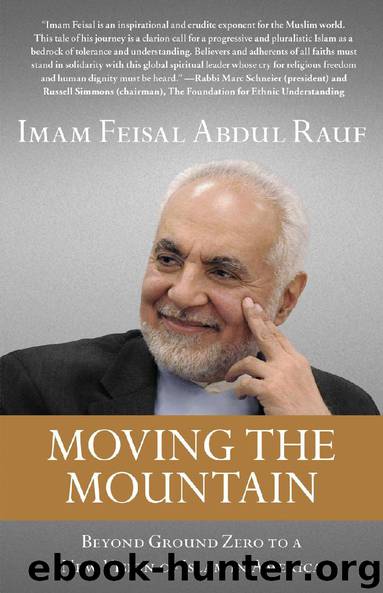Moving the Mountain by Imam Feisal Abdul Rauf

Author:Imam Feisal Abdul Rauf
Language: eng
Format: epub
Publisher: Free Press
In 2008, for example, the EASD persuaded a barber who had an illegal side business in FGC that the practice was un-Islamic and harmful to women. In exchange for new barber’s tools and some monetary compensation, he not only stopped the practice; he proudly displays to all his customers (in his thriving shop) a declaration from al-Azhar University that FGC is haraam. In another case, a poor widowed Egyptian midwife agreed to stop practicing FGC in exchange for an investment in her start-up grocery and poultry store.
I know that to many non-Muslim Americans, a marriage between Islam and feminism seems bizarre, but that perception is based on taking traditional cultural practices in Muslim-majority countries for Islamic practice itself. It also comes from not knowing the context in which major changes occur in the Muslim world (such as women becoming muftiyyah s, which does not make headlines in the United States). In fact there is a natural partnership between Muslim women activists and feminist movements in the United States, secular as well as religious, and around the world.
Our initiatives such as the WISE Project are having a powerful catalytic effect on the ground, putting the principles of a moderate, egalitarian, justice-seeking, merciful, and compassionate Islam into concrete practice. We help create openings, doors through what had been considered walls. Once we open one of these doors a little bit, others open them wider, allowing and encouraging thousands of women to pour through. We help men and women create social change in the context of their faith, change that inspires genuine social transformation.
Dress, Worship, and Culture
Since there has been so much controversy about women’s dress in Muslim countries and in the West, and so much verbiage about what “true Islam” requires, it is probably best to begin a discussion on the topic by differentiating between a society’s dress codes and what God requires of us. There are Muslims in many different countries, and most so-called Muslim practices are in fact the cultural practices of their societies.
Consider the question of worship and appropriate dress, especially head coverings. St. Paul weighed in early (1 Corinthians 11: 4–5): “Any man who prays or prophesies with something on his head disgraces his head, but any woman who prays or prophesies with her head unveiled disgraces her head—it is one and the same thing as having her head shaved.” There are relatively few contemporary Christians who would make the argument as strenuously as St. Paul, but traditionally in the United States Christian women have worn hats or scarves in church and men automatically took their hats off. The practices have become cultural norms far more than religious edicts.
Among Jews, the skullcap, known as the yarmulke (in Yiddish) or kippah (in Hebrew), has a conflicted history for both men and women. The Talmud argues for it (for men), but there is no apparent biblical injunction to wear one. Jewish denominations and movements have differed over a head covering during worship for over a century. While it has become
Download
This site does not store any files on its server. We only index and link to content provided by other sites. Please contact the content providers to delete copyright contents if any and email us, we'll remove relevant links or contents immediately.
Waking Up in Heaven: A True Story of Brokenness, Heaven, and Life Again by McVea Crystal & Tresniowski Alex(37809)
Empire of the Sikhs by Patwant Singh(23085)
We're Going to Need More Wine by Gabrielle Union(19046)
Hans Sturm: A Soldier's Odyssey on the Eastern Front by Gordon Williamson(18590)
Leonardo da Vinci by Walter Isaacson(13336)
The Radium Girls by Kate Moore(12028)
Tools of Titans by Timothy Ferriss(8395)
Educated by Tara Westover(8054)
How to Be a Bawse: A Guide to Conquering Life by Lilly Singh(7486)
Permanent Record by Edward Snowden(5847)
The Last Black Unicorn by Tiffany Haddish(5635)
The Rise and Fall of Senator Joe McCarthy by James Cross Giblin(5280)
Promise Me, Dad by Joe Biden(5153)
The Wind in My Hair by Masih Alinejad(5095)
A Higher Loyalty: Truth, Lies, and Leadership by James Comey(4963)
The Crown by Robert Lacey(4815)
The Iron Duke by The Iron Duke(4354)
Joan of Arc by Mary Gordon(4110)
Stalin by Stephen Kotkin(3965)
